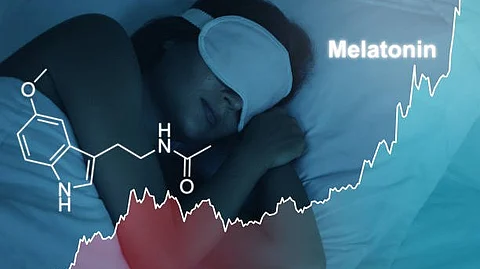

Researchers at McGill University and the University of Padua have made a groundbreaking discovery in understanding melatonin's role in regulating sleep. The study reveals the crucial function of the melatonin MT1 receptor in REM sleep, offering new hope for treating sleep disorders and related conditions like Parkinson's and dementia. A recent study published in the Journal of Neuroscience has shed light on the significance of melatonin's MT1 receptor in regulating REM sleep. This breakthrough discovery opens doors for developing targeted treatments for sleep disorders and associated neuropsychiatric conditions. Over 100 million people worldwide suffer from sleep disorders – but a new discovery may bring relief.
The researchers found that the MT1 receptor interacts with neurons producing noradrenaline, a neurotransmitter and hormone responsible for wakefulness. During REM sleep, these neurons quiet down, allowing for the "restore-and-recharge" phase.
Key Takeaways:
Melatonin MT1 receptor plays a crucial role in regulating REM sleep.
REM sleep is essential for memory consolidation, emotional regulation, and dreaming.
Disruptions in REM sleep are linked to serious conditions like Parkinson's disease and dementia.
Current hypnotic drugs adversely affect REM sleep; new treatments are needed.
This discovery not only advances our understanding of sleep mechanisms but also holds significant clinical potential.
Gabriella Gobbi, Professor of Psychiatry, McGill University, Clinician-Scientist, The Research Institute of The McGill University Health Centre
REM sleep plays a vital role in:
Memory consolidation
Emotional regulation
Dreaming
Brain restoration and rejuvenation
This research showing significant advancements in novel pharmacological interventions targeting REM sleep, personalized sleep disorder diagnosis and treatment, integration of sleep science into mental health and neurological care, increased awareness and education on sleep health and its impact on overall well-being.
Currently, there are no drugs specifically targeting REM sleep. Most hypnotic drugs on the market, while extending total sleep duration, tend to adversely affect REM sleep.
Dr. Stefano Comai, Professor at the University of Padua and Adjunct Professor, McGill University
Disruptions in REM sleep are linked to:
Parkinson's disease
Lewy body dementia
Other neuropsychiatric conditions
Impaired cognitive function
Increased vulnerability to mental health disorders
Ultimately, this research has the potential to transform the lives of millions affected by sleep disorders and related conditions, offering new hope for improved quality of life, enhanced cognitive function, and better mental health outcomes. As we continue to unravel the mysteries of sleep, we may uncover even more surprising connections between rest and overall health.
(Input From Various Sources)
(Rehash/Neha Kamble/MSM)
